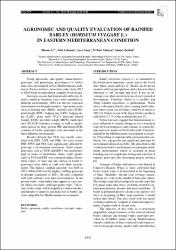AGRONOMIC AND QUALITY EVALUATION OF RAINFED BARLEY (HORDEUM VULGARE L.) IN EASTERN MEDITERRANEAN CONDITION
Özet
Using agronomic and quality characteristics, genotypic and phenotypic performance of barley lines were investigated in East Mediterranean condition in Turkey in three consecutive years from 2012 to 2014 based on randomized complete block design. Growing seasons had dramatically different climatic conditions therefore, years were considered as different environments. 2014 was the best selection environment for drought tolerance. Agronomic traits such as heading date (HDD), maturity date (MTR), plant height (PHT), lodging rate (LRT), lodging angle (LAN), grain yield (YLD,) thousand kernel weight (TKW), hectoliter weight (HKW), barley leaf spot (SCALT) tolerance scoring, as well as quality traits such as fat, fiber, protein (PR) and starch (STR) contents of barley genotypes were measured in the three different environments. Results showed that YLD was mostly correlated with PHT, MTR and FBR. All traits except PHT, HWT and PRT were significantly affected by genotype x environment interaction. Yield component traits such as TKW and HWT was moderately high in terms of heritability values while quality traits of FAT and PRT was contained highest heritability values. 13 lines and one cultivar of tested 25 genotypes were stable at yield over three environments. The highest yielding genotype was G16 in 2012. While G10 was the highest yielding genotype in drought conditions of 2014. All lines competed well with cultivars over three environments. In the present study, some barley lines appear to carry useful alleles for stable yield and quality traits. The results of this study will be helpful for barley breeders and farmers to improve and make use of barley cultivars adaptable for Mediterranean environments.


















